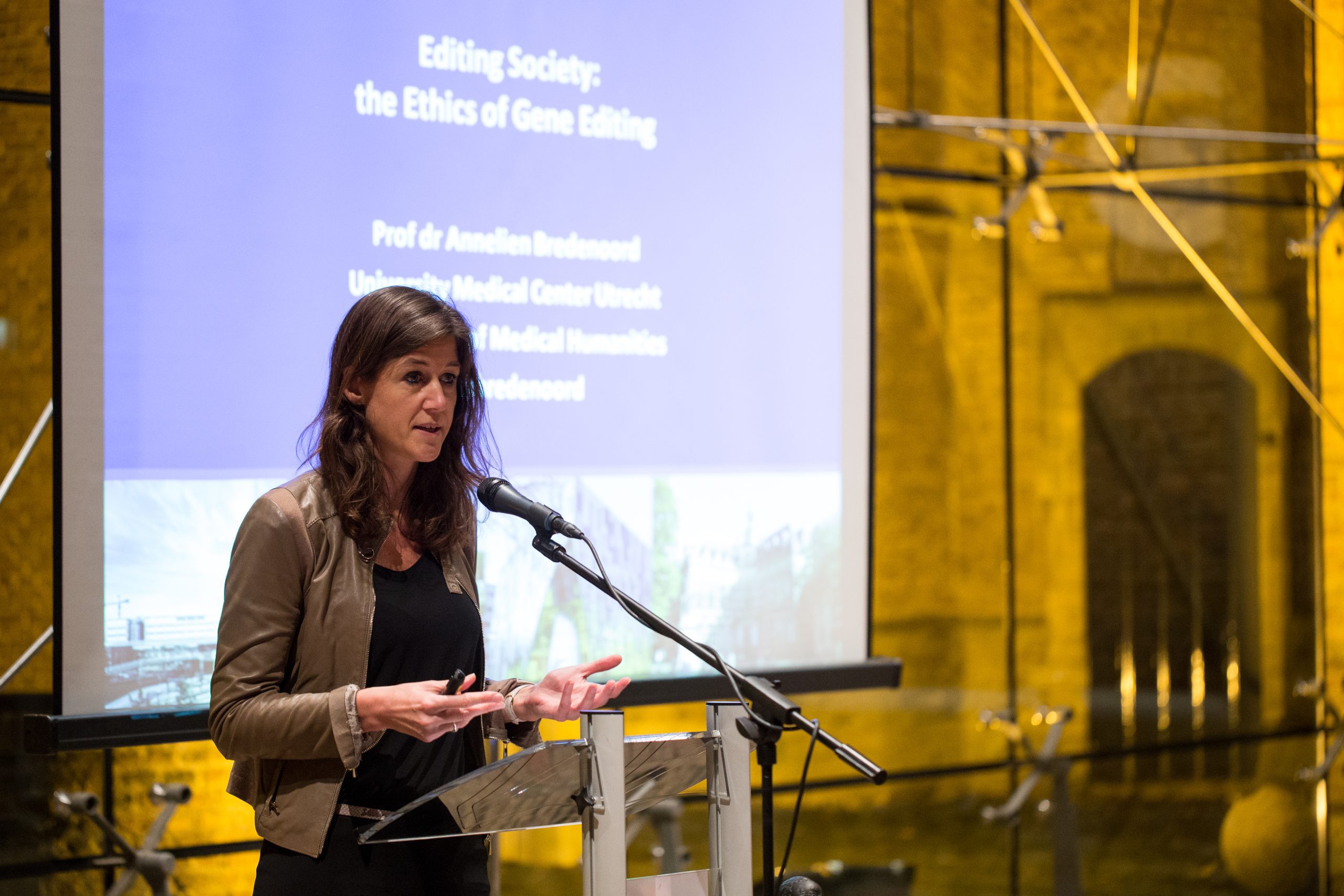The gene editing technology CRISPR-Cas has revived a 40-year-old debate. But this time, it’s for real, said Prof. Annelien Bredenoord at the Van Hasselt Lecture 2017.
Some 120 people attended the Van Hasselt Lecture in the modernistic glass cube in between the historic brick walls of the Delft Museum Prinsenhof. It was the third Van Hasselt Lecture on the ethics of technology. The organisation had invited Prof. Annelien Bredenoord to speak on the ethics of gene editing. Bredenoord teaches on the ethics of biomedical innovation at Utrecht University, and she is a member of the Dutch Senate for the liberal democratic party D66.
The field of gene editing ranges from crop improvements to designer babies. So to get to the core, Bredenoord left aside issues of genetic modification of crops and cattle and zoomed in on human gene editing. Within that domain, she focussed on the most sensitive topic: germline editing. Gene editing for basic research doesn’t raise many eyebrows. Curing diseases with CRISPR-Cas doesn’t meet with much resistance either, as long as the risks and benefits are well understood. Researchers are working on gene therapies for inherited diseases like sickle cell anaemia, muscular dystrophy, and even cancer. But as soon as genetic changes are transferred to the next generation, the debate starts. Germline modification, as the technical term goes, is the Rubicon of genetic modification, which should not be crossed according to present consensus. “As soon as we’re talking about making babies, the social ethical debate ignites,” Bredenoord notes. That may well explain her focus on the subject.
The genetic debate started in the 1970s after scientists had successfully transferred DNA from one organism into another. Transgenic microorganisms triggered both hope and worries concerning genetic engineering. Despite the enormous progress in technology since then, the debate has stalled. CRISPR-Cas technology, developed over the last five years, has made gene editing extremely precise, specific and cost-effective. CRISPR-Cas brings hypothetical constructs into the realm of reality, like eliminating hereditary diseases from the germline or adding favourable traits to your offspring. This technological progress is forcing us to reconsider our position towards gene editing. The Rubicon of germline engineering may be a lesser barrier than we assumed.
Babies, again, are good for inciting debate.
As an example of responsible genetic innovation, Bredenoord cited the decision-making process behind the UK parliament’s regulations that permit the clinical use of mitochondrial replacement techniques. The BBC wrote, ‘MPs said yes to three-person babies’. Babies, again, are good for inciting debate. Bredenoord regarded the broadly supported and careful decision-making process as a poster child of responsible innovation where regulations, funding and ethics have all been involved.
Forty years ago, concerned scientists met up in the Asilomar conference centre in California. One of the things they decided was the moratorium on genetic modification of humans.
Nowadays, we need a different discussion, argues Bredenoord. Responsible innovation starts with a discussion that includes philosophers and ethicists. The general public and politicians need to be involved because we have to establish what we value in terms of autonomy and quality of life.
Once again, scientists are concerned, with Jennifer Doudna, one of the discoverers of CRISPR-Cas, prominently among them. This time, however, the scientists haven’t issued a moratorium, but a statement. At the International Summit on Human Gene Editing in December 2015, they outlined the possibilities as well as the scientific, ethical and social issues. The statement calls upon national academies of science to take the lead in discussing the potential clinical uses of gene editing.
Bredenoord took the lead at the Van Hasselt Lecture by calling for a widespread societal debate on gene editing since we will all ultimately be involved. “Society may begin by editing genomes, but genome editing will edit society as well.”
After Bredenoord’s lecture Editing Society: the Ethics of Gene Editing, Rector Karel Luyben awarded the Mekel Prize for responsible innovation. Out of 22 entries, the jury chose the project Parsifal Playingfields by Dr. Rens Kortmann and theatre director Arlon Luijten.
Previous Van Hasselt Lectures by Studium Generale and the department Values, Technology and Innovation at the TPM Faculty:
- The Future of Peace, Weapons and War by Mary Ellen O’Connell (2015)
- The Dynamics of Big Data and Human Rights by John Tasioulas (2016)
The theme of the yearly Van Hasselt Lectures relates to ethics, technology, peace and justice. The series is named after the Delft student Frans van Hasselt, who gave a speech on 23rd November 1940 denouncing the dismissal of Jewish Professors at the university. Frans van Hasselt was arrested by the German occupying forces and died at the Buchenwald concentration camp in 1942.
Do you have a question or comment about this article?
j.w.wassink@tudelft.nl


Comments are closed.